Quazi
Member
Hello everyone.
Quazi here with another helpful (hopefully) DIY guide to help you along in your travels. But first:

Also, I'd like to take this opportunity to give mad props to this thread:
converting a home security light into a remote ballast grow light (the OG FAQ)

Now then: today, we're going to look at remote ballasting the 150w HPS Vapor Tight light. The one that I'm using here can be purchased from e-conolights. This is the $20.00 version mind you, not the $25.00.
I want to say one thing before I get started:

And don't forget to unplug:
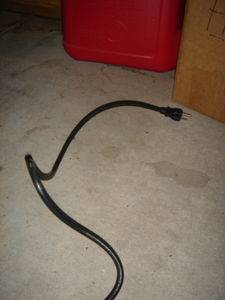
For all your wiring, I recommend getting heavy duty replacement cables. I purchased an 8 ft., 16 gauge replacement cord rated for 13 amps. Operating safely is important when you are doing something like this. To impart some electrical knowledge, I bring you Jorge Cervantes since I can't say it any better:
-Computer with 350W power supply?
-Lamps with 40W light bulbs?
-Printers?
-Heaters?
-Appliances?
-You get the point. Check your s$%& and don't overload your circuit.
Getting back to the cord... considering an 80% safe usage on the 13 amps, you can still safely use the wire for the 150W lamp. I will not go into the math here, again. If you are interested in the details: look up Ohm's Law.
With the electricity discussion behind us, we can now get onto the fun stuff.

 How To Remote Ballast a 150W HPS Vapor Tight Light
How To Remote Ballast a 150W HPS Vapor Tight Light 

So, the first step is getting your lamp. You can order it from the company using their online order form. I ordered an extra lamp with it. Here is what I got in the mail:
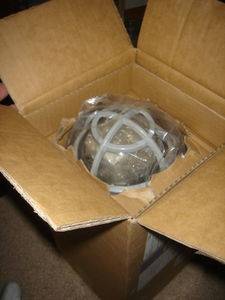
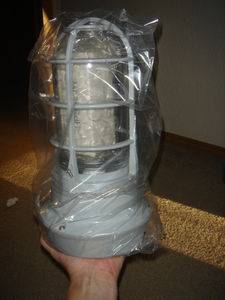
While that is on it's way, you should need some supplies. Before you go out and get some used supplies from some junk bin at a hardware place or out of a dumpster: consider where these electrics may be and/or what they may be near. Now consider the god-awful molded, rotted, worn down meth house this little electrical screw may have come from. Just think about that when you are getting supplies. They aren't very expensive and you'll have to clean the other stuff anyway. So, here's what you'll need:
-the previously discussed wire - I recommended 8ft. because that is plenty for my needs. In this guide, we will be cutting the wire in different lengths: 1 being the plug to the ballast, the other being the ballast where the lamp/socket needs to be. Ensure you get a long enough replacement cable, or additional cable, to suit your needs.
-a 4 inch electrical box
-some wire cutters and wire strippers (or a combo of the them)
-wire screws (variety pack with different sizes is good)
There are other alternatives to the above, but you get the idea.
Once a week or so has passed, you'll have your supplies and a lamp. Now that you have your light, you can become a little bit happier:

With your excitement complete, it's time to get your light out of the package and get it ready to disassemble:

The first thing you'll notice about the light is that it is much heavier and bulkier than anticipated. Trust me. The first two things to remove are the screws on the outside that hold the cage and "light jar" for lack of a better word:
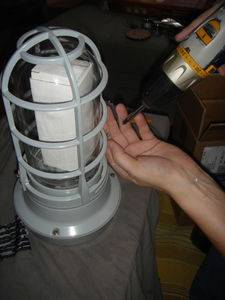
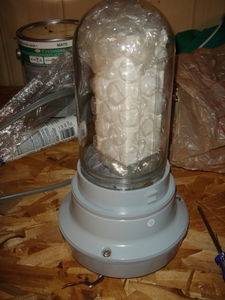
Screws removed, you can twist the cage and pull it off. The light jar will twist out, like a jar, and then you can get your lamp from inside. Set your lamp aside:
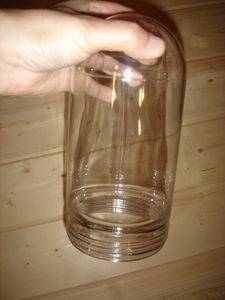
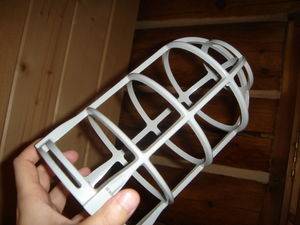
Try not to get too many fingerprints on the lamp. If you do, most suggest you wipe them off with a cloth:

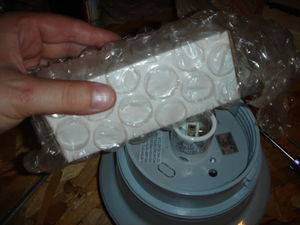
There are some weird hidden screws that you have to get to now. They are hidden underneath the large flat rubber guard in the ballast housing. Simply pry the rubber casing up and cut it off. You don't need it. Then you can access the screws underneath:
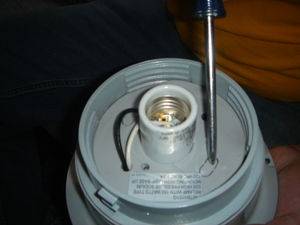
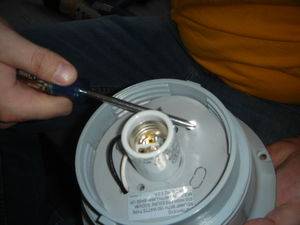
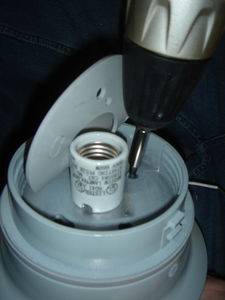
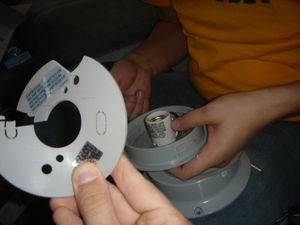
Once you have removed those screws, you will want to remove the screws that are in the very base of the light socket. They are two small silver screws. Be careful when you are removing these and use a small enough screwdriver to fit in there. You don't want to jam something in there and break the socket. I took the bit out of the screwdriver and used it:
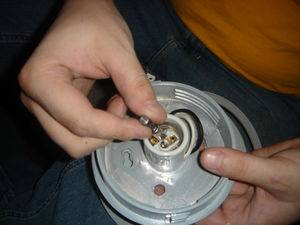
Now you can move to the 3 screws surrounding the ballast housing:
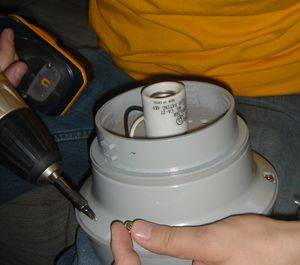
The light will open, and you will see the 4 parts that are the inside of the light.
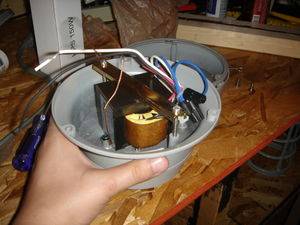
There is a brass colored bar that is holding the ballast in the casing. Leave that in there for now. You can inspect the parts now in all of their glory. Before you disassemble, take a good look at how the unit is wired. Especially if you are unfamiliar with wiring. While a guide can be helpful, but it is good to take a look for yourself. Take notes if you want. Now you can take off the big brass bar. Unscrew all the wire caps. If you took the screws out of the socket before, it will come off now. Now you have your ballast, your ignitor, and your socket. You should give yourself a pat on the back 'cause your halfway through.
Quazi here with another helpful (hopefully) DIY guide to help you along in your travels. But first:

Also, I'd like to take this opportunity to give mad props to this thread:
converting a home security light into a remote ballast grow light (the OG FAQ)

Now then: today, we're going to look at remote ballasting the 150w HPS Vapor Tight light. The one that I'm using here can be purchased from e-conolights. This is the $20.00 version mind you, not the $25.00.
I want to say one thing before I get started:

And don't forget to unplug:
For all your wiring, I recommend getting heavy duty replacement cables. I purchased an 8 ft., 16 gauge replacement cord rated for 13 amps. Operating safely is important when you are doing something like this. To impart some electrical knowledge, I bring you Jorge Cervantes since I can't say it any better:
Ensure that you have a fuse in your house that you can plug this into safely. You can see the amperage rating of your fuse by looking at the number on the fuse in your fuse box. Most will be 15. If you have an American circuit breaker then your are probably running 120V. Safe usage of the electricity running through there is %80. You want to maintain this to reduce heat buildup and/or overload. 120 * 15 = 1800W. 80% of that is 1440W. Now consider other things you may have running on that circuit:Electrical wire comes in many thicknesses (gauges) indicated by number. Higher numbers indicate smaller wire and lower numbers indicate larger wire. Most household circuits are connected with 14-gauge wire. Wire thickness is important for two reasons--ampacity and voltage drop. Ampacity is the amount of amperes a wire is able to carry safely. Electricity flowing through wire creates heat. The more amps flowing, the more heat created. Heat is wasted power. Avoid wasting power by using the proper thickness of well-insulted wire.
-Computer with 350W power supply?
-Lamps with 40W light bulbs?
-Printers?
-Heaters?
-Appliances?
-You get the point. Check your s$%& and don't overload your circuit.
Getting back to the cord... considering an 80% safe usage on the 13 amps, you can still safely use the wire for the 150W lamp. I will not go into the math here, again. If you are interested in the details: look up Ohm's Law.
With the electricity discussion behind us, we can now get onto the fun stuff.

 How To Remote Ballast a 150W HPS Vapor Tight Light
How To Remote Ballast a 150W HPS Vapor Tight Light 

So, the first step is getting your lamp. You can order it from the company using their online order form. I ordered an extra lamp with it. Here is what I got in the mail:
While that is on it's way, you should need some supplies. Before you go out and get some used supplies from some junk bin at a hardware place or out of a dumpster: consider where these electrics may be and/or what they may be near. Now consider the god-awful molded, rotted, worn down meth house this little electrical screw may have come from. Just think about that when you are getting supplies. They aren't very expensive and you'll have to clean the other stuff anyway. So, here's what you'll need:
-the previously discussed wire - I recommended 8ft. because that is plenty for my needs. In this guide, we will be cutting the wire in different lengths: 1 being the plug to the ballast, the other being the ballast where the lamp/socket needs to be. Ensure you get a long enough replacement cable, or additional cable, to suit your needs.
-a 4 inch electrical box
-some wire cutters and wire strippers (or a combo of the them)
-wire screws (variety pack with different sizes is good)
There are other alternatives to the above, but you get the idea.
Once a week or so has passed, you'll have your supplies and a lamp. Now that you have your light, you can become a little bit happier:

With your excitement complete, it's time to get your light out of the package and get it ready to disassemble:
The first thing you'll notice about the light is that it is much heavier and bulkier than anticipated. Trust me. The first two things to remove are the screws on the outside that hold the cage and "light jar" for lack of a better word:
Screws removed, you can twist the cage and pull it off. The light jar will twist out, like a jar, and then you can get your lamp from inside. Set your lamp aside:
Try not to get too many fingerprints on the lamp. If you do, most suggest you wipe them off with a cloth:
There are some weird hidden screws that you have to get to now. They are hidden underneath the large flat rubber guard in the ballast housing. Simply pry the rubber casing up and cut it off. You don't need it. Then you can access the screws underneath:
Once you have removed those screws, you will want to remove the screws that are in the very base of the light socket. They are two small silver screws. Be careful when you are removing these and use a small enough screwdriver to fit in there. You don't want to jam something in there and break the socket. I took the bit out of the screwdriver and used it:
Now you can move to the 3 screws surrounding the ballast housing:
The light will open, and you will see the 4 parts that are the inside of the light.
There is a brass colored bar that is holding the ballast in the casing. Leave that in there for now. You can inspect the parts now in all of their glory. Before you disassemble, take a good look at how the unit is wired. Especially if you are unfamiliar with wiring. While a guide can be helpful, but it is good to take a look for yourself. Take notes if you want. Now you can take off the big brass bar. Unscrew all the wire caps. If you took the screws out of the socket before, it will come off now. Now you have your ballast, your ignitor, and your socket. You should give yourself a pat on the back 'cause your halfway through.
Last edited:

 )
)

